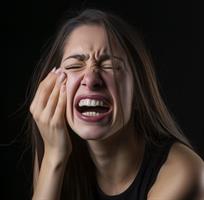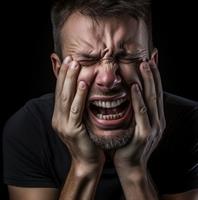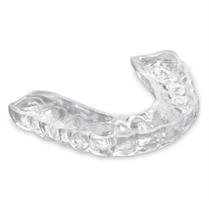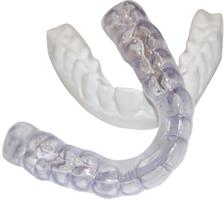Do you often wake up with a sore jaw or a headache? You might be suffering from bruxism, more commonly known as teeth grinding. This condition affects many people, but the good news is that there are various treatments and prevention strategies available.
In this article, we will discuss the types, causes, and risk factors for teeth grinding, along with “what causes teeth grinding” and the connection between stress and bruxism.
We will also explore various treatment options and prevention strategies to help you protect your teeth and enjoy a more peaceful night’s sleep.
Key Takeaways
-
Bruxism, commonly known as teeth grinding, is an involuntary medical condition characterized by clenching and grinding of the teeth.
-
Stress management strategies and lifestyle modifications can help to manage bruxism symptoms.
-
Dental solutions, alternative therapies such as biofeedback or Botox injections are also available for treatment options.
Understanding Bruxism: Teeth Grinding Types and Causes
Regular teeth grinding, known as bruxism, can result in sore jaw muscles and worn tooth enamel. There are two types of bruxism: awake bruxism and sleep bruxism, each with different causes and risk factors.
Teeth grinding is most common in children, with an estimated prevalence of 20% to 30%, but it can also affect adults. Emotional issues like stress can often be linked to teeth grinding, underlining the importance of dental diagnosis for bruxism.
Physical symptoms of bruxism include:
-
Worn or chipped teeth
-
Sore jaw
-
Headaches
-
Earaches
-
Facial pain
Some individuals grind their teeth without any adverse effects and may not even be aware they are doing it, particularly during sleep. Long-term damage, such as tooth wear and grinding noises, can result from untreated bruxism.
Awake Bruxism
Awake bruxism is characterized by involuntary clenching of the teeth and jaw bracing while a person is awake, often triggered by emotions like anxiety, stress, anger, or tension. Some of the typical symptoms of awake bruxism include soreness in the jaw muscles, tightness in the jaw, tiredness of jaw muscles, loud teeth grinding detectable by others, increased tooth pain or sensitivity, and headaches.
Awake bruxism can often result from common factors like stress, anxiety, and tension.
Sleep Bruxism
Sleep bruxism is a medical condition which occurs involuntarily during sleep. It is characterized by:
-
Clenching and grinding of teeth
-
It often occurs early in the sleep cycle, during stages 1 and 2 of non-REM sleep
-
It can involve varying numbers of episodes per night
The health of teeth and jaws can be at significant risk due to sleep bruxism, which can produce up to 250 pounds of force during grinding, potentially leading to jaw pain and loose teeth.
Risk Factors for Teeth Grinding
Teeth grinding is associated with several risk factors such as:
-
Family history
-
Gender
-
Age
-
Specific medical conditions
Research has demonstrated a genetic predisposition for bruxism, as it tends to run in families. While some studies suggest that clenching is more frequent in females, the gender difference in grinding teeth is not statistically significant. The likelihood of teeth grinding can increase with age.
Medical conditions linked to an elevated risk of teeth grinding include Parkinson’s disease, dementia, gastroesophageal reflux disorder, and sleep-related disorders like sleep apnea. Additionally, lifestyle factors such as stress and anxiety, recreational drug use, smoking, and misaligned teeth can contribute to the risk of teeth grinding.
The Connection Between Stress and Teeth Grinding
Both during wakefulness and sleep, stress significantly contributes to teeth grinding. Although the precise physiological mechanism linking stress and teeth grinding is not yet fully understood, scientific literature suggests that stress and anxiety may play a role in awake bruxism. Hence, stress management plays a key role in reducing bruxism episodes.
Cognitive Behavioral Therapy for Insomnia (CBT-I) is one form of talk therapy designed to improve sleep by addressing anxiety and stress. Implementing relaxation techniques, such as deep breathing exercises, yoga, and meditation, can also help manage stress and reduce teeth grinding.
Sleep Disorders and Bruxism
The likelihood of teeth grinding during sleep can be increased by sleep disorders like sleep apnea. In fact, the prevalence of bruxism in individuals with sleep disorders is as high as 30%. Research has demonstrated a correlation between sleep apnea and heightened levels of sleep bruxism, with individuals at an elevated risk of sleep apnea generally experiencing more severe bruxism.
Addressing sleep disorders like obstructive sleep apnea may be beneficial in controlling the severity of bruxism. Treatment options for sleep apnea include:
-
Continuous positive airway pressure (CPAP) machines
-
Oral appliances
-
Lifestyle changes, such as weight loss and avoiding alcohol or sedatives before bedtime.
Medications and Teeth Grinding
Teeth grinding can be caused or worsened by certain medications, especially antidepressants and antipsychotics. These medications may alter the concentration of neurotransmitters, like serotonin, in the brain, which could result in jaw clenching and teeth grinding. Some medications associated with teeth grinding include:
-
Aripiprazole
-
Duloxetine
-
Fluoxetine
-
Sertraline
-
Venlafaxine
If you suspect a medication is causing your bruxism, it is advisable to consult your doctor about the possibility of switching to an alternative. In some cases, adjusting the dosage or trying a different medication may help stop teeth grinding.
Children and Teeth Grinding
Growth or stress often leads to teeth grinding experiences in children. Some potential causes of teeth grinding in children include misaligned teeth, anxiety, and even pain from ear infections or allergies. Indications of teeth grinding in children include worn teeth and jaw or teeth discomfort.
Treatment options for children exhibiting signs of teeth grinding include the use of night guards and stress relief techniques. However, most children will outgrow bruxism by the time their baby teeth are lost, making treatment less crucial for this age group.
Diagnosing Bruxism
A physical exam that checks for worn teeth and enamel and considers facial or oral pain complaints can diagnose bruxism. During a dental exam, a dentist will inspect the teeth for signs of damage or wear, examine the jaw and face for pain or tenderness, and evaluate the patient’s medical history and symptoms. In some cases, dental X-rays may be employed to aid in the diagnosis.
Apart from dentists, healthcare providers and temporomandibular joint (TMJ) specialists may also diagnose bruxism through physical exams and symptoms.
Treatment Options for Teeth Grinding
Depending on the severity and the root cause, there are various treatment options available for teeth grinding. These treatments range from dental solutions like mouthguards, behavioral and lifestyle changes aimed at stress reduction, and alternative therapies such as biofeedback or Botox.
Dental Solutions
Mouthguards and mouth splints are the most common dental solutions for teeth grinding, as they protect teeth from damage and reduce grinding noise. Mouthguards are typically made of flexible rubber or plastic and can be custom-fitted by a dentist.
Dental splints, on the other hand, provide a protective barrier against grinding, which may be applied to a single section of teeth or a broader area, such as the entire upper or lower rows of teeth.
Behavioral and Lifestyle Changes
Behavioral and lifestyle changes, such as stress reduction and practicing good sleep hygiene, can help manage teeth grinding. Exercise and relaxation techniques, like deep breathing exercises or yoga, can also help reduce stress and alleviate bruxism symptoms.
Alternative Therapies
In some cases, alternative therapies like biofeedback or Botox may be effective in treating bruxism. Biofeedback involves using sensors to monitor and provide feedback on physiological processes, helping individuals become aware of their jaw muscle activity and unlearn the behavior, thus diminishing bruxism symptoms.
Botox injections have been found to be effective in managing sleep bruxism. By paralyzing the facial muscles responsible for it, this procedure can help to reduce the associated grinding of teeth and other symptoms.
Prevention Strategies for Teeth Grinding
Addressing the underlying causes and risk factors is key to preventing teeth grinding. Strategies for prevention include reducing stress levels, adhering to good sleep hygiene, and addressing any underlying medical conditions.
Talking to a friend, relative, or therapist about what is causing stress can be the first step in stress reduction. Practicing relaxation techniques, such as deep breathing exercises and yoga, can also help manage stress and prevent teeth grinding.
Good sleep hygiene practices, like establishing a regular sleep schedule, creating a comfortable bedroom environment, and avoiding stimulating substances close to bedtime, can help prevent bruxism. If necessary, wearing a custom-fitted mouthguard overnight can provide additional protection against teeth grinding.
Summary
In conclusion, teeth grinding, or bruxism, affects many people and is often caused by stress, sleep disorders, or certain medications. By understanding the causes and risk factors of bruxism, you can take steps to protect your teeth and improve your quality of life.
Whether through dental solutions like mouthguards, behavioral and lifestyle changes for stress reduction, or alternative therapies like biofeedback or Botox, there are numerous treatment options available to help you manage bruxism. Don’t let teeth grinding hold you back; take control of your oral health today.
Frequently Asked Questions
Is teeth grinding a symptom of anything?
Teeth grinding (bruxism) can be a symptom of various conditions such as mental health disorders, medical conditions, hyperactivity, sleep apnea, stress, anxiety and even certain medications. Severe cases of bruxism can cause damage to teeth, jaw pain, tiredness and headaches.
How do you stop grinding your teeth?
To stop grinding your teeth, practice techniques to reduce stress and tension such as relaxation training, exercising, massaging jaw muscles, and avoiding stimulating substances. Consider using a mouth guard and avoid chewy foods. Talk to your dentist about short-term muscle relaxant prescriptions.
What deficiency causes teeth grinding?
Vitamin D deficiency and low consumption of calcium are associated with sleep bruxism, which in turn can cause teeth grinding. Research is needed to determine if supplementing with vitamin D and calcium can help relieve sleep bruxism.
What is the difference between awake bruxism and sleep bruxism?
Awake bruxism is characterized by clenching or grinding of teeth during the day, often due to stress or anxiety, whereas sleep bruxism occurs at night and is associated with sleep disorders.
Can certain medications cause teeth grinding?
Yes, certain medications can cause teeth grinding, particularly antidepressants and antipsychotics.




